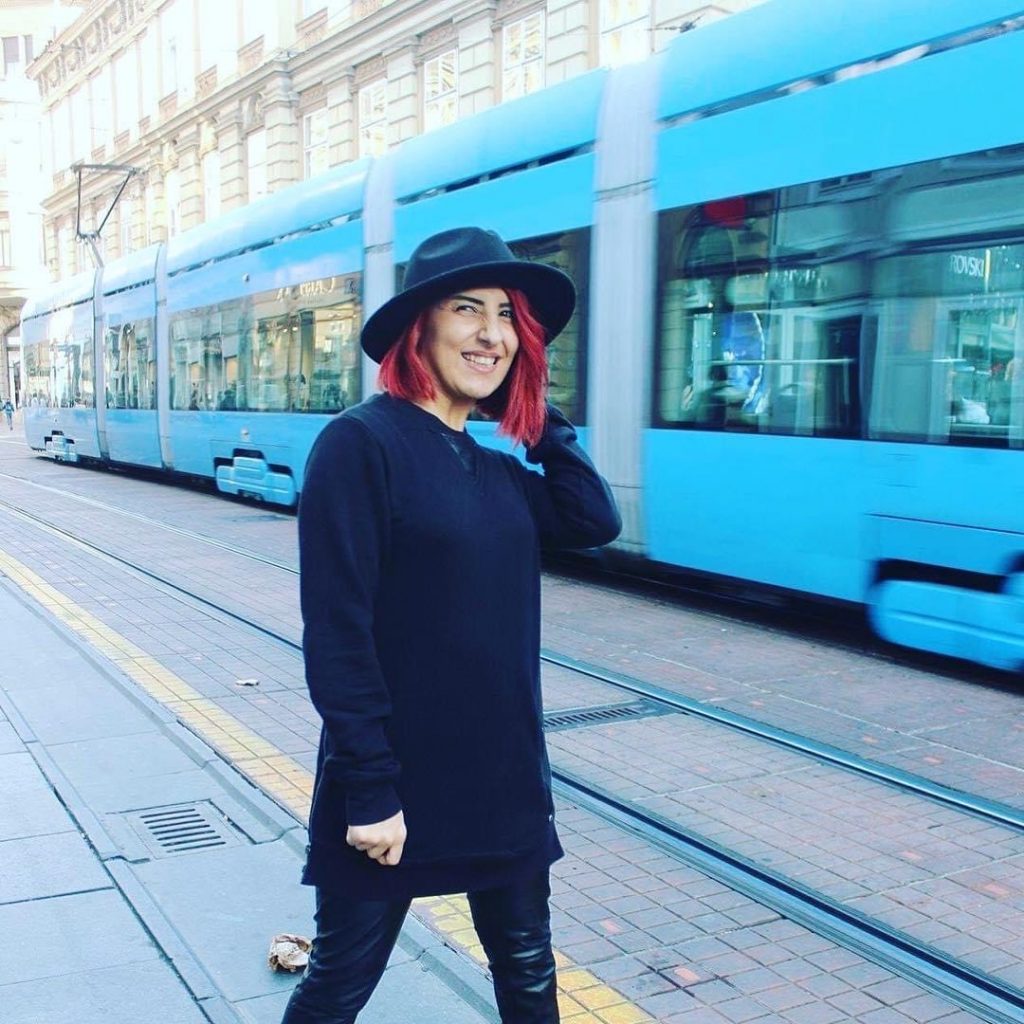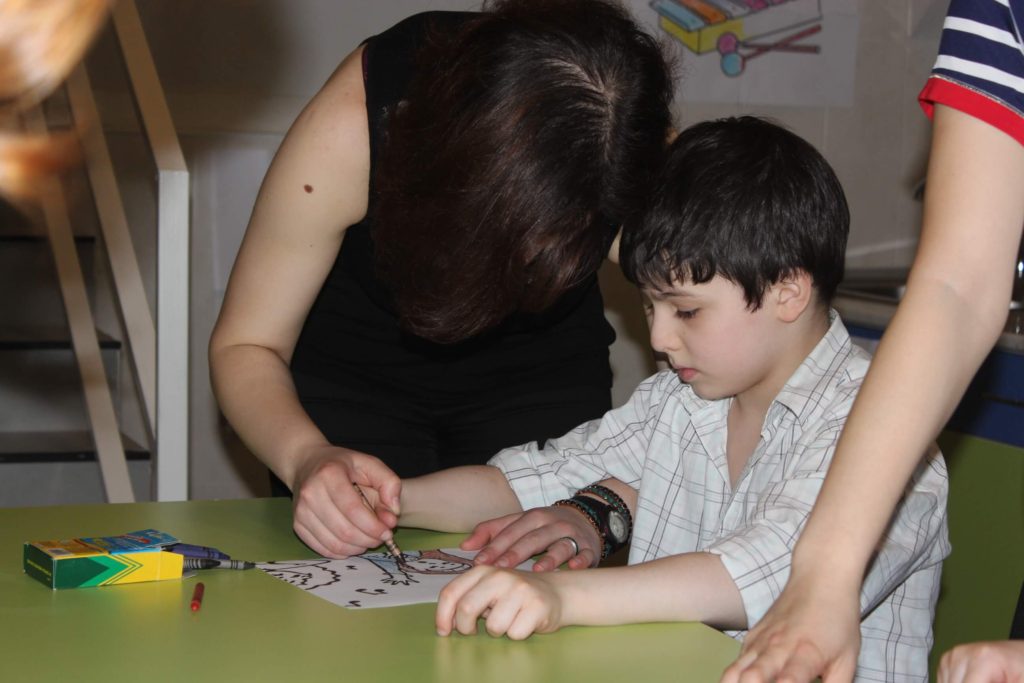What problems do children with disabilities face in Georgia?
Growing up during the post-Soviet period in Georgia as a child with special needs, it was not easy for Fefiko to enter the state education system. “During Soviet times, people were trying to hide children with disabilities in Georgia. I had to overcome many problems to get into school”, Fefiko explains.

Fefiko´s diagnosis is cerebral palsy, which is generally being described as a disorder of the brain that affects a person´s ability to move, maintain balance, and it sometimes can also be connected with some other disabilities, such as seizures, vision, hearing, or speech impediment. Cerebral palsy can develop during the pregnancy, because of an infection, as a result of complications during the labor or during the first half-year of children´s life. The symptoms vary from person to person.
For Fefiko, the most restricting problem is moving. Because of the disease, it can be hard for her to climb the stairs or walk long distances. “I´ve spent most of my childhood at hospitals. It was a huge work to go to school at the time, but I was lucky, because I had amazing people around me – my friends, family, teachers at school, they all helped me to adapt”.
Overcoming the fear of failing
According to Fefiko, it is very important to help people with some kind of disability to grow their self-confidence, so that they are aware that they can do anything. It does not matter, what kind of disability they have, there is always some solution.
Fefiko, for example, had overcome her fear of getting lost thanks to her mother. “I don´t remember places well, so I get lost easily, especially when visiting new places. That´s why I always need some prominent building to remember the place. But my mum would always tell me to go alone everywhere, she would support me to do everything by myself and I think it helped me to become more independent. For people like me, it´s very good to have someone staying beside them and encouraging them to find their own way”.
Finally, Fefiko graduated from Georgian European University. She got her bachelor’s degree in journalism and she also has a diploma in Social Media Management from a vocational college. It took her six years to find a job. She describes the difficulties of job hunting as being associated not only with the stigma in society but also being feared by people with disabilities. “When I was searching for a job, it was always in my mind: what if the building is not adapted for people with disabilities, what if it´s not barrier-free”.
In the meantime, she was trying to keep herself busy by volunteering. “My friends were always making jokes about it: are you still working as a volunteer? Stop it! But for me, it was important to do something meaningful. Today, I am 32 and finally, I´ve reached the point, when people are actually calling me with a job offer”.
Nowadays, Fefiko works as an administrator of Inclusion.ge web page which belongs to the Inclusive Dducation department of the Ministry of Education and Sciences. Besides that, she also works as a trainer – especially for parents, who have a child with special needs. “All I´ve experienced during my childhood, I can use now to help other people who are in a similar position. I´ve been through almost everything”.
How children with special needs could be supported in Georgia
Since 2012, it became compulsory for every public school in Georgia to accept children with special needs. Even though the legislation moved forward, the stigma in Georgian society around people with disabilities is still strong, especially in villages.

Fefiko sees the biggest problem in families, who are not willing to recognize their children or other members of family as somebody who needs special care.
In Tbilisi, when the first Autism Centre based on behavioural therapy was established in 2010, the founders had a problem finding children they could educate. “The stigma was still so strong, that we could only find 15 children with autism”, describes Sophie Kereselidze, one of the founders of Autism Centre. At that time, those 15 children would attend six hours of behavioural therapy every day and the services were free, because the employees of Autism Centre were still students and were not payed. Kereselidze recons it was the best time for those children, as they had enough attention, and they improved speaking and singing skills very fast.
Nowadays, there are around seven Autism Centres in Tbilisi and the demand for professional help is growing as well as the cost of services. One hour of Behavioral therapy costs around 35 GEL because there are professional behavioural psychologists working with the children at Autism Centre. That is a big amount, as the parents of a child with special needs can only get financial support of 250 GEL per month from the government. “Every child with a diagnosis automatically receives a pension until the age of 18, but this pension is not enough to cover all costs for rehabilitation therapy. The need for an adult person with the diagnosis of autism is 10 hours, and a child needs at least 20-25 hours a week. But in Georgia, the rehabilitation state programme covers only 20 hours of therapy in a month”, explains Kereselidze. Apart from the Applied Behavioural Analysis, physical, occupational and speech therapies are also required.
Neither the financial state support, nor the government-covered hours of therapy are enough, but it is still better than nothing. According to Kereselidze, it is important that parents make the first step and start searching for help. “The first step is to determine if the child has a developmental disorder. That could be done by a general practitioner by filling the health certificate f100. Then the doctor makes a statement about the child needs disability status”, says Kereselidze.
Things are also slowly moving forward in society. “During the past years, we worked intensively on the introduction of a sustainable value system in which children`s needs are met by addressing wide-spread myths, misconceptions, and stigma around people with disabilities in Georgia. The stigma around persons with disabilities decreased from 41% in 2015 to 28% in 2017. There is a progress, but the number is still high”,Maya Kuparadze, Education Specialist for education-related questions in UNICEF (United Nations Children’s Fund) states.
Fefiko considers it to be her life mission to spread awareness about special education opportunities in the countryside. Apart from her work at the Ministry of Education and Science, she also takes part in different projects of Georgian NGOs and organizations working towards facilitating inclusive education. During the summer, she was participating in webinars with the Union of Woman with Disability in Georgia. “If possible, I always go to villages, where the stigma around people with disabilities is stronger. Due to Covid-19, I worked remotely last summer, which was actually a great opportunity for me, because I had much more time. I made around 5 webinars – training courses for parents, about the possibilities there are for children with special needs. I was very excited about it because I´ve touched their mind and after the webinar, they were already thinking a little bit differently”.
She tries to give all the support to parents, who consider asking for special support in education for their child. If parents decide to do so, they need to fill in a form available on the web page of the Ministry of Education and Sciences. After the form is filled, professionals from Ministry of Education and Sports consider the situation of every child separately, assess the child’s needs, and offer recommendations to teachers and parents. Ministry of Education and Sciences in Georgia offers this possibility to all school-age children. All information listed in the form is confidential and accessible only for the Ministry and staff members of the Department of General Education Development. Ministry of Education and Sciences in Georgia offers special plans for children aged 5-17.
Every teacher’s responsibility
The problem is that there are not enough specialized assistants at schools in Georgia to help children with special needs individuals. The profession of a personal assistant is poorly paid and there are only a few specific training programs that a teacher can attend for free. But as there is a general lack of knowledge and understanding of disabilities, a career of a specialized assistant is not attractive enough for many teachers.
According to Gabriela Turner, primary school teacher at the British International School of Tbilisi, not every student with special needs requires a one-to-one specialist. “It is in the job description of a teacher to make education accessible to all students therefore learning differentiation is woven into lesson plans automatically and then delivered in class”.
On the other hand, Turner agrees that if the disability affects behavior, then it can be difficult to get children to access the learning and minimize disruption to the learning of other students in the class. “Some students with special needs require 1:1 specialist, while others can function just fine with support from the teacher and class assistant. As a teacher, I do not prefer one over the other – as long as every student has the right support that is appropriate for their needs”. As Gabriela works at a private school, the services provided to SEN students might differ from public schools. But according to law, private schools should also provide a special teacher in class with SEN students, who, together with the teacher, provides the necessary support to a child during integration, inclusion, adaptation, and learning.
However, there are not enough well-planned regular training programs and mechanisms for teachers in-service training and professional growth provided by the Ministry of Education and Science, neither there are enough accredited NGOs, academia, or other professional organisations who would be able to provide teacher training in authorised programmes in schools. The inclusive education system also suffers from the lack of financial incentives for teachers to work with children who need extra service and the lack of fundings to improve teacher´s capacity and school climate in general.
So far, most of the children with special needs depend on their primary teacher and their willingness to pay an extra attention to them. From the experience of primary teacher Gabriela Turner a teacher working with SEN students should have patience, empathy, a kind nature, a strong work ethic and a desire to obtain the pedagogical knowledge on how to effectively deliver education to children with special needs. As a teacher, she also considers it good for the other pupils to be exposed to children who are a little different from them and learn to be patient and empathetic.


















